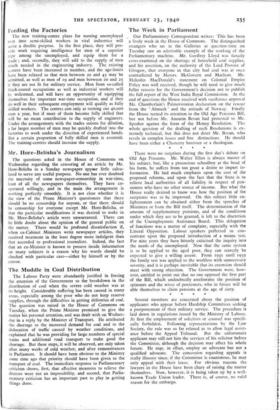There were no surprises during the first day's debate re
Old Age Pensions. Mr. Walter Elliot is always master of his subject, but, like a precocious schoolboy at the head of his form, he suffers from too great a desire to impart in- formation. He laid much emphasis upon the cost of the proposed reforms, and upon the fact that the State is to relieve local authorities of all liability in respect of pen- sioners who have no other source of income. But what the House really desired to know was how the position of the recipients was to be improved. On this subject little en- lightenment can be obtained either from the speeches of Ministers or from the Bill itself. The determination of the amount of supplementary pensions, and of the conditions under which they are to be granted, is left to the discretion of the Unemployment Assistance Board. This delegation of functions was a matter of complaint, especially with the Liberal Opposition. Labour speakers preferred to con- centrate upon the proposed introduction of a means test. For nine years they have bitterly criticised the inquiry into the needs of the unemployed. Now that the same system is to be applied to the aged poor, they can scarcely be expected to give a willing assent. From 1931 until 1935 the family test was applied to the workless with unnecessary severity, and it is perhaps inevitable that its extension should meet with strong objection. The Government were, how- ever, entitled to point out that no one opposed the first part of the Bill, which undoubtedly ameliorates the position of spinsters and the wives of pensioners, who in future will be able themselves to claim pensions at the age of sixty.






































 Previous page
Previous page